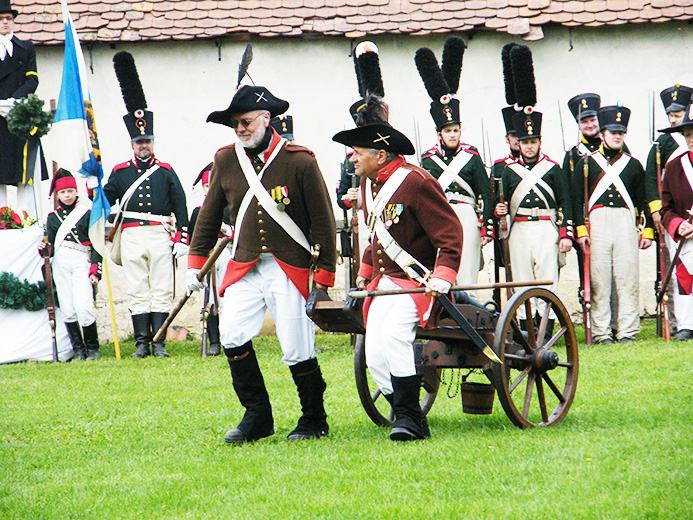William Francis Hannell - International iForum • foto: Jana Parkanová • 29 May 2014
Why Historical Films can’t/CAN be Good
On May the 15th, a lecture was held in the Faculty of Arts by Professor Robert A. Rosenstone from the California Institute of Technology, entitled “What Does the Historian Filmmaker Do (to History)? : Inventing Truth on the Movie Screen”.
I must admit, before this lecture began, I had my doubts. As a historian and keen Medievalist re-enactor, I thought to myself, was he really going to try and justify Braveheart? However, Rosenstone provided a sound argument as to why films are not insufficient because of their supposed careless dealings of historical fact. Using clips from the film Glory, about a unit of African-American soldiers raised during the American Civil War, Rosenstone argued that films can do more than just entertain us, they are apparently a perfectly legitimate way of doing history.

One scene from Glory that he used is the opening, in which you hear words which you automatically assume come from the letters of a real historical figure, Colonel Robert Gould Shaw, who led the 54th Volunteer Infantry. Except they’re not they’re what we are supposed to imagine he would write. The whole scene is a generic construction of common motifs from the American Civil War that Americans are familiar with (corn cob pipes, the blue uniforms, and so on). It’s a kind of “proximate reality” for a historical truth. Essentially, film invents its own truths about the past. Rosenstone showed four other clips from the film, none of which actually depict any real historical events (or in the case of one, a real event, but not how it actually happened). Rather, they contain images and metaphors relating to the overall story of the film; for example one generalises the experiences of the African-American soldiers in these units through a scene portraying four different dramatic stereotypes: the intellectual, the country boy, the Black Nationalist, and the wise elder (unsurprisingly played by Morgan Freeman).
These metaphors and images, Rosenstone argues, are a crucial part in why “history films” (as he prefers to call films that are trying to make a sense of history) are useful and beneficial; they allow us to think about the past, and they have a strong experiential quality, so that were almost living in them (which according to the latest Neuroscience research, may actually help us learn the history). History films can actually teach a lot, as they can give metaphors which perfectly sum up the zeitgeist of an era.
These generalisations and metaphors exist because the filmmaker needs to create a past that fits into the demands, practices, and traditions of both visual media and dramatic form; the latter is especially important; the history film is history (as Rosenstone put it, jokingly riffing on a Hitchcock quote) “with the boring parts left out”. Otherwise, the film would be less capable of making people interested in history. The past is just the stuff that happens, and is put into a story to make it more understandable, history and film take the past and turn it into history in order to make it more understandable. Because of its arbitrariness, history writing and filmmaking are one and the same, though Rosenstone stresses that only in certain elements that history and film are the same. Also, as Rosenstone points out; you can never make a film entirely accurate, as there are certain details you will never know. Sometimes, the emphasis on detail can ruin a film; as Rosenstone emphasises with the Adam Chronicles, a TV series about the Adam family who spawned two presidents, and where the dialogue was taken from their personal letters. A slippage of minor details does not matter.
Film is often better at displaying historical ambiguities by simply showing things, other than telling them. The expectations we have about historical films are unfair.
We can’t really analyse and evaluate historical films the same way as we would a book, because it just won’t work. Film is often better at displaying historical ambiguities by simply showing things, other than telling them. The expectations we have about historical films are unfair. We can’t expect them to be unbiased, to do what books do, they are constructions (like history books). We should be more merciful to the history film, after all, the poor thing has only had a century to develop, whilst the history book has been around for 2000+ years.
Of course, I have my reservations. These metaphors that Rosenstone speaks so highly about are sometimes influenced in the times that the film was created in, and can give entirely wrong impression and generalisations. In Braveheart for example, the impression is given that there was a united Scotland against those evil nasty pantomime villain-like English; when in fact it was actually more of a Scottish civil war, Highland versus Lowland, just like the Jacobite rebellions. Rosenstone seems to fail to understand that historical films often reflect the prejudices and values of current society. It is in effect, modern culture in a historical setting. For example, we see this in the way that religion is left out of medieval films or TV productions. In medieval society religion was all important, but in current society it isn't. Politics and political ideology can also warp and influence history films too (Battleship Potemkin and Alexander Nevski anyone?). Furthermore, many history films seemingly purport to be factual retellings of an event, or give people the impression that they are when in fact they’re not. This, combined with the influence of contemporary politics and prejudices, can give people metaphors and imagery that are just wrong, giving people incorrect generalisations and impressions of the age/events depicted (a possible solution, and something that came up in the Q&A after the lecture, may be the creation for a historiography for history films, just like you have with written history).
Rosenstone’s argument however, is nonetheless original and insightful, and is deserving of praise. To Rosenstone, a good history film can provide a complicated vision of the past that demands attention, a challenge, a provocation, and a paradox. They can create a counter-discourse that can change the way we see a piece of history. Rosenstone’s favourite history film is Alex Cox’s Walker, because it presents history as a black comedy and violates all the rules. For these reasons it was derided, but for those same reasons it was a brilliant history movie. Rosenstone said we should treat the history film better, after all, there isn’t actually any systematic criteria for assessing them; and when have history books ever been unbiased, or completely factually correct?
|
William Francis Hannell is an Erasmus student from Britain (home university: Aberystwyth University), studying History and English Literature at the Faculty of Arts in Charles University. Email is |

